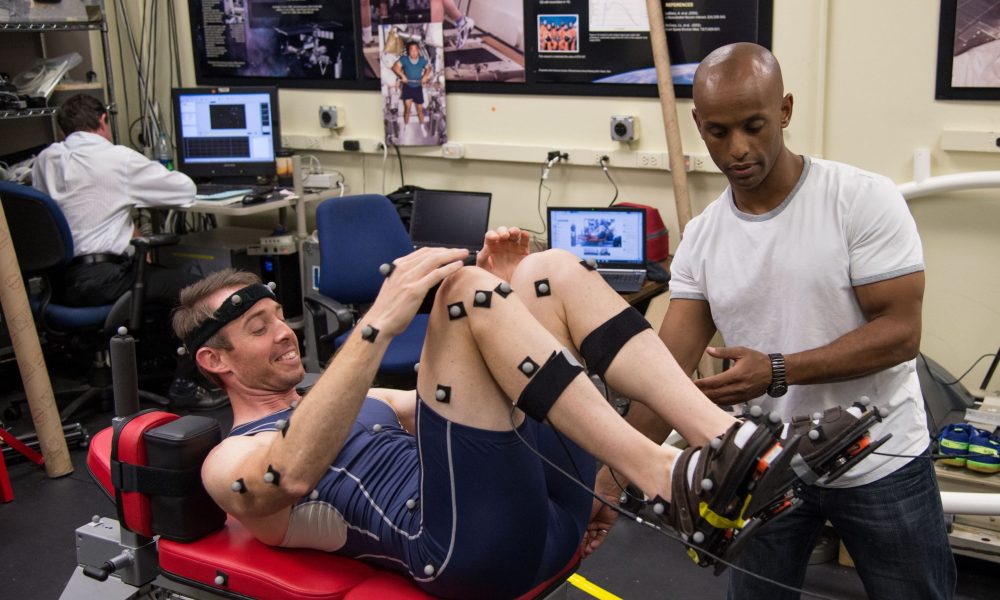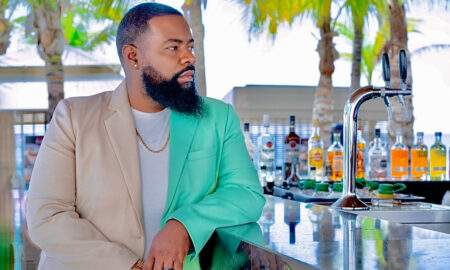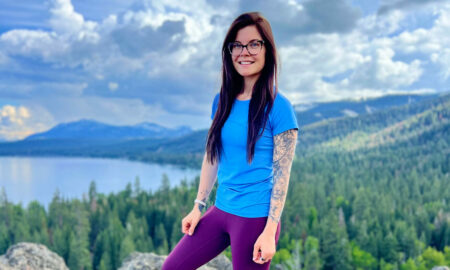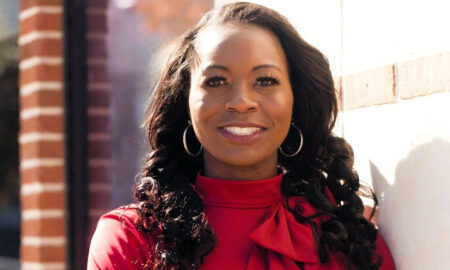

Today we’d like to introduce you to Lealem Mulugeta of Medalist Performance.
Lealem, let’s start with your story. We’d love to hear how you got started and how the journey has been so far.
Like all good stories, I suppose, this one begins with some hope and some dreams. The dreams of a young boy growing up in Ethiopia in the midst of poverty and illness. As far back as I can remember, I was consumed by visions of moving to North America where I imagined my family and I could enjoy the peace and live our dreams, and let me tell you, I had many dreams.
I was filled with visions of exploring the cosmos. I wanted to become a gymnast. I also had all kinds of ideas of someday curing diseases like those I was surrounded by. For many reasons, me achieving any one of them was against all the odds. Yet I was an idealist, getting into lots of trouble with family, friends and neighbors because of my idealism. No matter the opposition I faced, I just could not “grow out of it.” I suppose I still haven’t.
Anyhow, as fortune would have it, my father fled Ethiopia and got us out six years later through Uganda. When we moved to Canada, I had to re-learn a whole new culture and language. I earned a degree in Mechanical-Aerospace Engineering while working three jobs and pursuing competitive gymnastics on my “spare time.” None of this was easy, but it was the foundation that taught me how to push the human body and mind beyond perceived limitations.
After completing my engineering degree and working in the industry for a couple of years, I moved to France for graduate school in space studies. As a by-product of my years of hard work and dedication, I was recruited to join NASA’s Digital Astronaut Project (DAP). In less than three years, I was promoted to DAP Project Scientist.
As the Project Scientist, I was responsible for the scientific content and direction of the project. We developed highly complex computational models using all our cutting-edge knowledge in human physiology, anatomy, exercise science, human health and performance, engineering and much more. I also took the lead in helping NASA spin-off our work to healthcare applications by actively engaging with the National Institute of Health (NIH), the Food and Drug Administration (FDA), the Department of Defense, and other leading organizations.
I am very proud of my work at NASA. It helped me integrate my life-long passions for spaceflight and pushing the limits of human potential. I got to work on real problems that didn’t just matter to space exploration, but also to the average person. I also got to be part of the leading edge in human health and performance research, with real scientific backing and practical application.
After my tenure at NASA ended in 2015, and many soul searching, I formed Medalist Performance in 2016 to take all this learning to the next level and bring it to real-world people. Through the work I do at Medalist Performance, I get to tailor programs for each of my clients by combining cutting-edge research with real-world know-how. And I get to watch them exceed their own perceived limitations. It is incredibly fulfilling.
Has it been a smooth road?
There were a number of reasons that I should not have achieved any of my dreams. Yet the obstacles and struggles that I have faced have taught me a lot about myself, as well as about resourcefulness and resilience. Those struggles taught me how to help my clients face up to and learn from their own struggles. Because let’s face it, if you are going to reach for peak performance, you are going to go places you have never been before. To do that, you are going to have to overcome obstacles you never knew existed.
Let’s take my athletic development over the years for example. Much of my childhood was spent ill with all sorts of conditions. These conditions made me extremely underweight, often making me the smallest and weakest amongst my classmates. This was true right up until my early twenties. Just to give you an idea, I weighed 50lb at age 11, while most of my peers weighed 70lb or more. I did not break 120lbs until I turned 21 years old, and it took a lot of work to get there. It is tough to have any athletic dominance when you are the smallest and weakest.
To add to this, I was well past what is considered the “optimal age” when I was finally able to join a competitive gymnastics club. The stigma around age in gymnastics can be brutal. I remember several instances when coaches and athletes would harass me because they believed I was “too old” to start competing. In fact, some even attempted to get me kicked out of the club.
From an academics standpoint, I did not learn how to read until I was eight-years-old. Writing was a whole challenge of its own. It would cause anyone to doubt any notion I had of achieving any academic excellence, let alone be a lead scientist at NASA!
Migrating from country to country hasn’t been easy either. For example, when we left Ethiopia, it was tremendously difficult to start from scratch. Learning to speak a new language, let alone relearning how to read and write in that language while also adapting to a new culture and struggling financially.
Over these many years of unrelenting dedicated work, I’ve had several life events (too private to discuss) that have forced me to start from scratch more than once. I would be lying if I said I never thought of quitting. But from an early age, I learned I can reshape my reality through deliberate, systematic and persistent work. And I am grateful to be able to use my experiences and expertise to help people do the same and give back to society.
We’d love to hear more about your work.
Medalist Performance is dedicated to delivering state of the art peak performance coaching for active and aspiring athletes, astronauts, tactical personnel and executives. This is distinctly different from a typical fitness, personal training or coaching program because the focus is to help our clients discover their peak physical, mental and intellectual performance. In many cases, we help them surpass what they believed they were capable of. They also experience substantial improvement in their health and physical appearance.
But the part of my work that drives me is the transformational changes I’ve been able to make in people’s lives, and the deep connections I’ve formed with many of them. I can’t even begin to describe how humbling it is to have so many of my clients go from complete strangers to considering me as part of their family.
The transformational changes the Medalist Performance system produces lies in the proprietary coaching curricula to deliver highly personalized programs using:
NASA Research: We apply our extensive experience with NASA’s astronaut exercise and space biomedical research and development program to ensure our clients have an edge on the competition.
Scientifically Driven Programming. We are adamant about using scientifically based coaching techniques. We invest a substantial amount of time vetting and applying the latest progress in all domains of peak performance coaching.
Practical Experience: Although we have a strong scientific foundation upon which we have built our coaching programs, we also recognize the methods and systems we layout must be readily applicable to the real world. So we take every measure to ensure that our scientific methods are substantively complemented with our many years of practical experience in athletics and high-pace professional lifestyle.
Individualized Programming: The one thing we absolutely refuse to do is to treat an individual the same as everyone else. Regardless of the coaching curriculum, a client enrolls in, their program will be individualized to their unique needs with respect to:
• Physiologic performance development
• Anatomical and body composition attributes
• Biomechanical optimization
• Nutrition coaching
• Injury recovery and prevention education
• Mental performance coaching
Data Analytics: We use scientifically sound techniques to track and analyze all aspects of our clients’ progress so that they have a clear understanding of their progress relative to their performance goals and their potential competition.
Versatile Delivery Format. Our coaching programs are available both in-person and virtual formats to meet the unique accessibility needs of our clients. However, regardless of the coaching format, every client has a virtual portal where all aspects of their program will be administered and monitored.
Where do you see your industry going over the next 5-10 years? Any big shifts, changes, trends, etc?
Now, more than ever, there’s an ever-increasing call to do more with less. We see this in everything from athletics to the military to the demands of corporate jobs. That level of increasing demand is not sustainable unless we have a paradigm shift in the way we try to meet those demands.
For example, we continue to see records being broken in athletics. As humans, we outperform what was previously thought was possible for the human body to achieve. And yet the demands on our athletes continue to rise. The same might be said of the unrelenting demands for continuously peak performance from corporate America, healthcare, uniformed professionals or those in spaceflight. We can’t expect to continue to outpace ourselves with the same methods we used to get here. We can’t simply expect people to keep working harder and longer. This will ultimately lead to persistent injuries, overtraining, burn out, and mental health breakdown to name a few. We see this manifested in athletes and uniform professionals having to endure chronic injuries and mental health issues during and after their careers. There are rising numbers of substance abuse and suicide cases with uniform, legal and medical professions.
So how do we get to sustainable excellence? Rather than taking a siloed approach, we need to start to develop a deeper understanding across multiple key disciplines and let all of them inform a plan for success for each individual. For example, if we want to produce truly sustainable elite athletes, we must develop a deeper understanding of the science of sports performance. Current approaches expect a coach to have a deep understanding of the sport or skill involved. The way forward would involve deep expertise across a number of areas like performance psychology, nutrition, injury prevention and recovery as well as physiology, anatomy, and biomechanics as it relates to the particular sport involved.
Those who can capture the multidisciplinary approach are those who are going to have the key edge in sustainable peak performance going forward. I think we are going to see this across the board.
Contact Info:
- Website: https://medalistperformance.com/
- Phone: 281-816-7999
- Email: lealem@medalistperformance.com
- Instagram: https://www.instagram.com/medalistperformance
- Facebook: https://www.facebook.com/MedalistPerformance








Suggest a story: VoyageHouston is built on recommendations from the community; it’s how we uncover hidden gems, so if you or someone you know deserves recognition please let us know here.

















